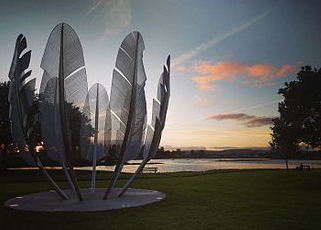
- Details
- By Neely Bardwell
St Patrick’s Day is a day to remember the death of St. Patrick, Ireland’s patron saint. It is also a day to remember the close relationship the Choctaw Nation of Oklahoma has with the people of Ireland.
The relationship goes back to the Great Famine. During the years 1845 through 1852, the Irish people were experiencing a potato famine. It was during this time that a disease poisoned the Irish’s potato crops which caused mass starvation and death. Their population decreased by 20 - 25 percent.
Want more Native News? Get the free daily newsletter today.
Even before the Irish famine, the Irish were plagued by colonization efforts perpetrated by England. The Irish language, culture, and traditions were nearly eradicated.
The history of the Irish is something that resonates deeply with Native communities.
Because of this empathy, the Choctaw people decided to do what they could to assist the Irish. In 1847, they sent them $170—which is close to $5,000 in today’s dollars—across the Atlantic Ocean through a group of Quakers. The money was used to help feed the starving people in Ireland. Even though the Choctaw people had been forced on their Trail of Tears, a deeply devastating event, only 16 years prior, they still did what they could to help.
The Irish were eternally grateful, and still express their gratitude in many ways today.
In 2017, a sculpture was erected in Midleton, Ireland. Called "Kindred Spirits," the sculpture was erected to remember the special bond the Choctaws maintain with the Irish. "Kindred Spirits" was dedicated to the kindness and goodwill of the Choctaw people.
In 2018, then Ireland’s Prime Minister Leo Varadkar visited the Choctaw Nation and created a continuing series of yearly scholarships for Choctaw students to study in Ireland
Most recently in 2020, amidst the COVID-19 pandemic that severely plagued the Navajo Nation and Hopi Reservation disproportionately compared to the wider American public, the Irish made a large donation to those communities.
More Stories Like This
Native News Weekly (August 25, 2024): D.C. BriefsUS Presidents in Their Own Words Concerning American Indians
DHS Secretary Noem Tells Tribes ICE Does Not Target Native Americans
Native News Online Marks 15 Years of Warrior Journalism
I’m a Minneapolis Postal Worker. This Is What I Saw.
Help us defend tribal sovereignty.
At Native News Online, our mission is rooted in telling the stories that strengthen sovereignty and uplift Indigenous voices — not just at year’s end, but every single day.
Because of your generosity last year, we were able to keep our reporters on the ground in tribal communities, at national gatherings and in the halls of Congress — covering the issues that matter most to Indian Country: sovereignty, culture, education, health and economic opportunity.
That support sustained us through a tough year in 2025. Now, as we look to the year ahead, we need your help right now to ensure warrior journalism remains strong — reporting that defends tribal sovereignty, amplifies Native truth, and holds power accountable.
 The stakes couldn't be higher. Your support keeps Native voices heard, Native stories told and Native sovereignty defended.
The stakes couldn't be higher. Your support keeps Native voices heard, Native stories told and Native sovereignty defended.
Stand with Warrior Journalism today.
Levi Rickert (Potawatomi), Editor & Publisher

